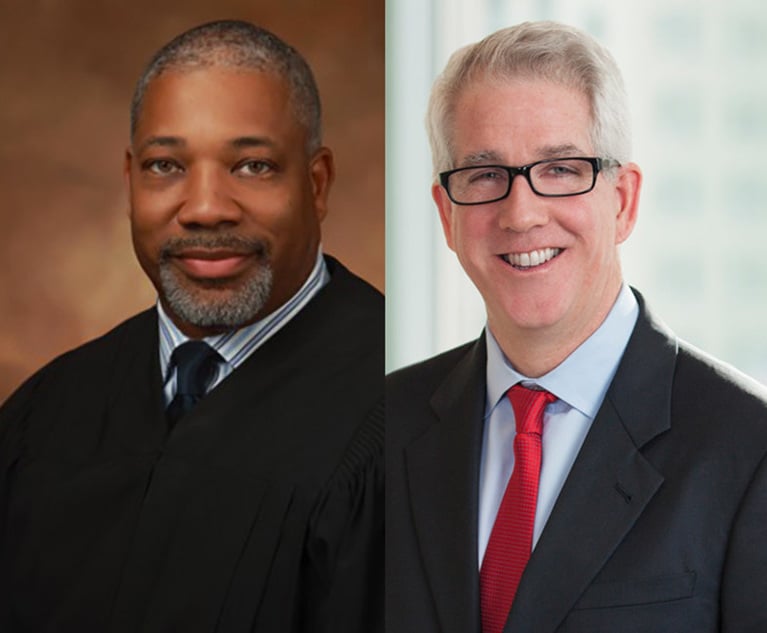 Photo: Koldunov Alexey/Shutterstock.com
Photo: Koldunov Alexey/Shutterstock.comUS Judge, Weighing 'Tincher,' Green-Lights Strict Liability Claims Against Med Device Maker
Especially at the motion to dismiss phase, U.S. District Judge Michael Baylson of the Eastern District of Pennsylvania said it made more sense to allow the strict liability claims to proceed.
January 21, 2020 at 04:58 PM
4 minute read
In a decision wading into the ramifications of the Pennsylvania Supreme Court's seminal decision in Tincher v. Omega Flex, a federal judge has rejected efforts to carve out an exception to strict liability law for the makers of prescription medical devices.
On Jan. 16, U.S. District Judge Michael Baylson of the Eastern District of Pennsylvania rejected efforts by medical device company Coloplast seeking to toss the strict liability claims from the case Gross v. Coloplast. The ruling denied the company's motion to dismiss for failure to state a claim on the strict liability issues.
Coloplast had sought to expand protections afforded to the makers of prescription drugs under comment K to Section 402 of the Restatement (Second) of Torts, citing the 2006 Pennsylvania Supreme Court decision in Creazzo v. Medtronic. But, in his 11-page ruling, Baylson said that, under the more recent Tincher, the Pennsylvania Supreme Court has advised judges not to make categorical decisions about products with regard to liability.
"The Pennsylvania Supreme Court has strongly discouraged Pennsylvania courts from carving out certain categories of products for special treatment within the common law of products liability," Baylson said, citing Tincher.
READ THE RULING:
Rieders, Travis, Humphrey, Waters & Dohrmann attorney Clifford Rieders said that, although district courts in Pennsylvania have previously waded into the issue, Baylson's ruling provides the first in-depth analysis on whether comment K should be expanded in the wake of Tincher.
"What Tincher said, and what product liability law said, is you don't categorize between products. That puts the court in the role of making public policy," Rieders said. "There's no basis, under Tincher, for artificial distinctions."
Morgan, Lewis & Bockius attorney Wendy West Feinstein, who is representing Coloplast, did not return a call seeking comment.
According to Baylson, Crystal Gross and her husband Timothy Gross sued Coloplast over its allegedly defective pelvic mesh device in 2018. Baylson noted that the U.S. Food and Drug Administration initially approved the device, but ordered the company to stop selling it in April 2019. The Grosses raised eight claims, including three based on strict liability.
Coloplast filed a motion to dismiss several causes of action, arguing that the plaintiffs failed to make a claim.
Baylson explained that comment K to Section 402A exempts certain "unavoidably unsafe products" from strict liability claims, and that in 1996, the Supreme Court adopted the comment with regard to strict liability claims involving prescription drugs. That ruling came in Hahn v. Richter.
Coloplast, according to Baylson, argued that Creazzo, in which the Superior Court extended Hahn to encompass prescription medical device makers, indicates that the Supreme Court is likely to extend comment K protections to prescription devices. But Baylson rejected that argument.
According to Baylson, in the wake of Creazzo, the Supreme Court has specifically cautioned against "lightly altering the common law of products liability," and that subsequent Supreme Court rulings have noted Hahn was based on a "rather one-dimensional analysis" that "offers a poor foundation for extrapolation."
Especially at the motion to dismiss phase, Baylson said it made more sense to allow the strict liability claims to proceed.
"The Pennsylvania Supreme Court has cautioned Pennsylvania courts against making categorical carveouts from the presumption of strict liability without, at the least, a rich factual record on the policy issues that should inform a common law analysis of whether to allow these claims," Baylson said.
This content has been archived. It is available through our partners, LexisNexis® and Bloomberg Law.
To view this content, please continue to their sites.
Not a Lexis Subscriber?
Subscribe Now
Not a Bloomberg Law Subscriber?
Subscribe Now
NOT FOR REPRINT
© 2024 ALM Global, LLC, All Rights Reserved. Request academic re-use from www.copyright.com. All other uses, submit a request to [email protected]. For more information visit Asset & Logo Licensing.
You Might Like
View All
Phila. Med Mal Lawyers In for Busy Year as Court Adjusts for Filing Boom
3 minute read


'Grave Matter of Serious Consequences': Why a Missouri Judge Sanctioned a Top Kirkland & Ellis Attorney
10 minute readTrending Stories
- 1Gibson Dunn Sued By Crypto Client After Lateral Hire Causes Conflict of Interest
- 2Trump's Solicitor General Expected to 'Flip' Prelogar's Positions at Supreme Court
- 3Pharmacy Lawyers See Promise in NY Regulator's Curbs on PBM Industry
- 4Outgoing USPTO Director Kathi Vidal: ‘We All Want the Country to Be in a Better Place’
- 5Supreme Court Will Review Constitutionality Of FCC's Universal Service Fund
Who Got The Work
Michael G. Bongiorno, Andrew Scott Dulberg and Elizabeth E. Driscoll from Wilmer Cutler Pickering Hale and Dorr have stepped in to represent Symbotic Inc., an A.I.-enabled technology platform that focuses on increasing supply chain efficiency, and other defendants in a pending shareholder derivative lawsuit. The case, filed Oct. 2 in Massachusetts District Court by the Brown Law Firm on behalf of Stephen Austen, accuses certain officers and directors of misleading investors in regard to Symbotic's potential for margin growth by failing to disclose that the company was not equipped to timely deploy its systems or manage expenses through project delays. The case, assigned to U.S. District Judge Nathaniel M. Gorton, is 1:24-cv-12522, Austen v. Cohen et al.
Who Got The Work
Edmund Polubinski and Marie Killmond of Davis Polk & Wardwell have entered appearances for data platform software development company MongoDB and other defendants in a pending shareholder derivative lawsuit. The action, filed Oct. 7 in New York Southern District Court by the Brown Law Firm, accuses the company's directors and/or officers of falsely expressing confidence in the company’s restructuring of its sales incentive plan and downplaying the severity of decreases in its upfront commitments. The case is 1:24-cv-07594, Roy v. Ittycheria et al.
Who Got The Work
Amy O. Bruchs and Kurt F. Ellison of Michael Best & Friedrich have entered appearances for Epic Systems Corp. in a pending employment discrimination lawsuit. The suit was filed Sept. 7 in Wisconsin Western District Court by Levine Eisberner LLC and Siri & Glimstad on behalf of a project manager who claims that he was wrongfully terminated after applying for a religious exemption to the defendant's COVID-19 vaccine mandate. The case, assigned to U.S. Magistrate Judge Anita Marie Boor, is 3:24-cv-00630, Secker, Nathan v. Epic Systems Corporation.
Who Got The Work
David X. Sullivan, Thomas J. Finn and Gregory A. Hall from McCarter & English have entered appearances for Sunrun Installation Services in a pending civil rights lawsuit. The complaint was filed Sept. 4 in Connecticut District Court by attorney Robert M. Berke on behalf of former employee George Edward Steins, who was arrested and charged with employing an unregistered home improvement salesperson. The complaint alleges that had Sunrun informed the Connecticut Department of Consumer Protection that the plaintiff's employment had ended in 2017 and that he no longer held Sunrun's home improvement contractor license, he would not have been hit with charges, which were dismissed in May 2024. The case, assigned to U.S. District Judge Jeffrey A. Meyer, is 3:24-cv-01423, Steins v. Sunrun, Inc. et al.
Who Got The Work
Greenberg Traurig shareholder Joshua L. Raskin has entered an appearance for boohoo.com UK Ltd. in a pending patent infringement lawsuit. The suit, filed Sept. 3 in Texas Eastern District Court by Rozier Hardt McDonough on behalf of Alto Dynamics, asserts five patents related to an online shopping platform. The case, assigned to U.S. District Judge Rodney Gilstrap, is 2:24-cv-00719, Alto Dynamics, LLC v. boohoo.com UK Limited.
Featured Firms
Law Offices of Gary Martin Hays & Associates, P.C.
(470) 294-1674
Law Offices of Mark E. Salomone
(857) 444-6468
Smith & Hassler
(713) 739-1250





